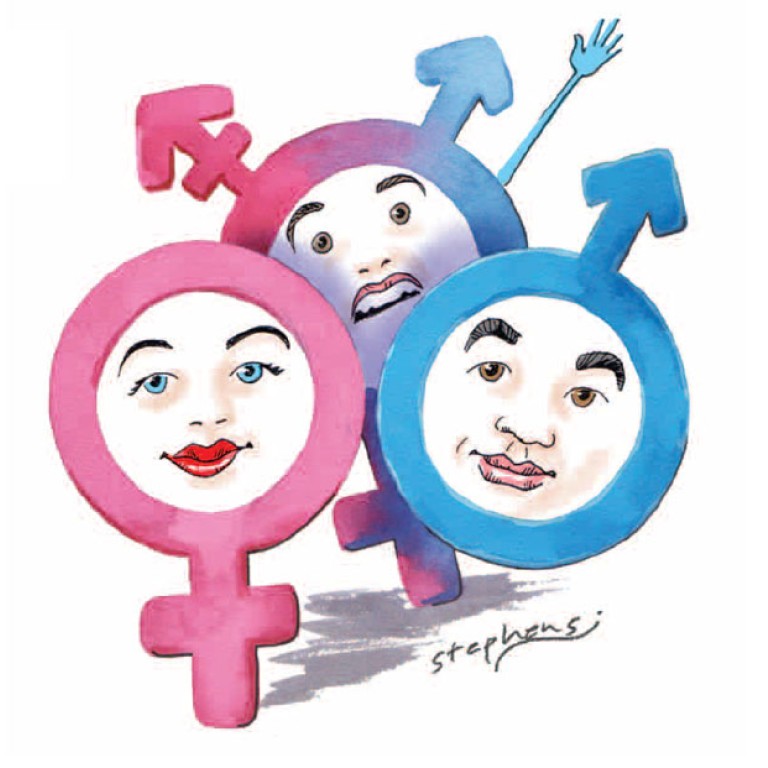
Marriage bill surgery requirement for transsexuals cruel and degrading
Sam Winter says the bill to enshrine surgery requirements for transsexuals into the marriage law is cruel, ignores international authorities and runs counter to developments elsewhere
On Wednesday a bills committee of the Legislative Council will meet to examine the Marriage (Amendment) Bill, the government's proposal to amend the marriage law to allow transsexual people who have undergone "full sex reassignment surgery" (removal of sex glands and genitals, and construction of new genitals) to be recognised, for the purpose of marriage, as the sex to which they have been "reassigned".
I am a psychologist. For about 14 years I have worked with transsexual people.
All transsexual people are unique, of course, just like other human beings. But transsexual people also have one thing in common - the desire to live and be accepted as members of the other sex. This is the core characteristic of transsexualism as described in the International Classification of Diseases, the diagnostic manual used worldwide by those working in health care and published by the World Health Organisation.
Many transsexual people have identified as they do for most of their lives, perhaps as long as they can remember. There is growing evidence that there may be a biological predisposition for transsexualism. Therapy to "cure" transsexual people is widely viewed as ineffective and potentially harmful. The World Professional Association for Transgender Health (WPATH) views such approaches to transsexuals as unethical.
Some transsexual people prefer to identify as transgender, using a somewhat broader and vaguer term than the medical diagnosis of transsexualism. But whatever label they choose, it is that deep and often long-standing desire to live and be accepted as a member of the other sex that justifies a diagnosis of transsexualism.
Many transsexual people become deeply distressed when those around them - in their families, school, workplace and more broadly in society - cannot or will not accept them in their personally experienced gender. International research (including in Hong Kong) reveals high rates of unemployment, as well as depression and anxiety, among transsexual people.
Self-harm, including suicidal behaviour, is alarmingly common. A few years ago, within the space of two weeks, two local transsexual women committed suicide in separate incidents.
Around the same time, I was talking with a group of five local transsexual women in an otherwise pleasant conversation and learned that all of them at some time in their lives had attempted suicide.
A few months ago a young transsexual woman I know was admitted to hospital after attempting suicide twice in one week, depressed about her circumstances. Part of her problem arose out of the fact that she had not undergone the sort of "downstairs" surgery the Hong Kong Immigration Department demands as a precondition for issuing a new ID card and which the marriage bill proposes as a requirement for the right to marry.
So every time she was asked to show her ID, she was outed and often humiliated. Once she was out of intensive care, she was placed in a psychiatric ward. Incredibly, she was placed in a male ward.
Which brings me to surgery. True, many transsexual people get terribly distressed about their bodies. For these people, hormones and surgery can be life-changing (even life-saving) and constitute a medical necessity. However, such procedures are not a panacea. That is especially true for the "downstairs" surgery, which is highly invasive and complex and, for some transsexual people, inadvisable on health grounds. Complications are common. Corrective surgery may be needed. (One local trans woman confessed to seven operations.) Outcomes are often imperfect in terms of appearance and/or function.
Some transsexual people do not experience a deep desire for surgery. This is a point that the WHO diagnostic manual makes clear. For these people, surgery is not essential to their health and well-being and is therefore not a medical necessity.
Some of my transsexual clients tell me that the main reason they want "downstairs" surgery is so that they can get a new ID card, enabling them to lead an ordinary life and get a job, take on an apartment lease, open a bank account, get a loan, or even collect a parcel from the post office without humiliating stares and giggles, intrusive questioning or even being refused service.
Now the government proposes to enshrine surgery requirements into legislation. Such legislation would arbitrarily separate one group of transsexual people from another, not on the basis of diagnosis, but purely on the basis of the sort of health care they have received. Legislation that withholds the right to marry from those not "surgically reassigned" would also undermine fundamental principles of bodily integrity and free consent and embed elements of coercive medicine into transsexual health care.
It would also force a person to give up a right (such as reproductive rights) to gain one (marriage).
In short, such legislation contains cruel and degrading requirements that drive a coach and horses through at least four international conventions to which Hong Kong is a party. It ignores the voices of international authorities in rights and health, from Amnesty International to the UN High Commissioner for Human Rights and from WPATH to WHO. It also runs counter to developments across much of the rest of the world.
I urge members of the bills committee to press for removal of the surgery provisions from the Marriage (Amendment) Bill, or, failing such changes, for withdrawal of this bill. This bill surely has no place in a civilised society.
